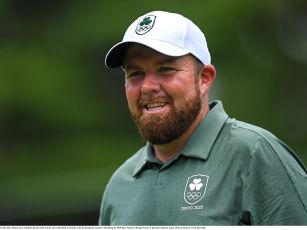Cage Legacy Fight Night hosted the testing of Safe MMA Ireland’s recommendation for one-off brain scans for all amateur MMA competitors on Saturday night at the Barbican, Drogheda.
With eight amateur MMA fights on the night, 16 fighters had to undergo scans and gain medical clearance before taking to the cage.
Irish MMA’s amateur governing body, IMMAA, implemented the recommendation on Saturday night despite the backlash that came after Safe MMA Ireland’s announced the recommendation.
Speaking after the event, Barry Oglesby, IMMAA’s Sport Liaison Officer for Sport Ireland, claimed that the event was a “great success”.
“The event went very well,” said Oglesby.
“In terms of organizing the scans for the fighters, it was very new. We did have some guys that were delayed being cleared because they didn’t leave enough time between getting their scan and the event itself, but everything was sorted when the card got underway.
 Ciaran Clarke poses with brother Daryl Clarke and John Kavanagh. Image: Peter Carroll.
Ciaran Clarke poses with brother Daryl Clarke and John Kavanagh. Image: Peter Carroll.
“I have to praise the work of our medical provider Code Blue, and particularly Glen Ellis. Not only did he organize a great deal with Affidea that will allow fighters to be scanned for the same rate Dan Healy secured with the Bon Secours, he went out of his way to make sure all of the fighters on the card were scanned.
“In terms of using this event as a test case, it was a great success. We’re going to take stock of it over the next few days. We will talk to the medical providers, fighters, coaches and promoters to see how they how they felt about the requirements.”
Glen Ellis of Code Blue stated that he made sure there were “no stumbling blocks” for fighters on route to gaining medical clearance. Ellis gave some insights into the deal he secured with medical provider Affidea, who have matched the Bon Secours special rate of €150 for amateur MMA proponents seeking brain scans.
“It was my job to work with IMMAA and make the scans as easily accessible as possible for tonight,” said Glen Ellis of Code Blue, the official medical provider of IMMAA.
“We made sure there were no stumbling blocks in their way. We also made sure that we found a proper rate for the scans. Dan Healy from Safe MMA Ireland already secured a rate of €150 for fighters to undergo scans at the Bon Secours and I was able to secure the same rate with Affidea.
“They have seven locations nationally, and fighters can use any of them to get scanned.”
Safe MMA Ireland hosted an open forum last month at the Royal College of Surgeons to field any questions from the community on their recommendation for amateur brain scans. One of the problems that was brought up was the difficulty some fighters were having securing referrals from their GPs.
 Ciaran Clarke raising his hand in victory after lightweight title win over Adam Nowak. Image: Peter Carroll.
Ciaran Clarke raising his hand in victory after lightweight title win over Adam Nowak. Image: Peter Carroll.
According to Ellis, Code Blue has been working on a template that will help streamline the process for MMA proponents.
“What we plan to do moving forward is to have a template, which the fighters will take to their GP to get the referral for the scans,” stated Ellis.
“There was some trouble with referrals when mandatory scans were brought in for the professionals, we hope this will make the referral a lot easier to secure.”
Ellis highlighted that Affidea is the first medical provider to invite an MMA organization to use their services. As well as giving MMA competitors a special rate on scans, Affidea will also provide private scan centres for professional bouts and a medical database for fighters which Ellis can access at all times.
He also stressed the importance of stating his name when seeking a scan from Affidea that will allow fighters to access the special rate.
“Something that is very important for fighters to know is they have to state my name to get the rate when they go to Affidea,” he said.
“Affidea will allow me to have access to all of the fighters scans with this in place. So, in a case where a fighter has to be transported to the hospital after a fight, I can easily access their brain scans on my laptop, which I can give to the medical staff on duty.”
Fighters securing scans at the eleventh hour led to some late withdrawals from pro cards last year because it left no time for investigations into anomalies that were found in the results. Ellis insisted that fighters need to allow adequate time to gain clearance, and recommended that any athletes who are booked to fight should get scanned as soon as possible.
“I can’t stress how important it is to get the scans done as quickly as possible. You should not wait until two weeks before your fight to get a scan. If you know you’re going to be fighting, get the scan done now.
“It makes you a far more desirable fighter for promoters if you have up to date medicals. It also allows time to investigate anything that comes up on the scan. There have been situations where we have found neurological anomalies, which may be nothing, but require a neurological referral. That could add a few weeks to the process of being cleared.”
Cage Legacy promoter Declan Kenna revealed that it was difficult to get some fighters medically cleared for the event, but maintained that he was happy to become the first promoter in Ireland to reach the recommended medical standard.
“It was tough to get some of the fighters across the line, but I’m glad that we did in the end,” said Kenna. “There were a few scans that needs a little more investigation, but we managed to get it done.
“There was a lot of backlash when the intention to go forward with amateur brain scans was announced, but I think we’ve proven tonight that putting on events with the medical requirements in place is definitely achievable.
“It was more work for me, but that was mainly going back and forth with Safe MMA Ireland and Code Blue. It was a bit more difficult, but I think it will be even smoother the next time around.
“I’m very happy to be the first promoter to reach the standard set by Safe MMA Ireland and IMMAA and I’m looking forward to working with them again ahead of Cage Legacy 2 on March 24.”
IMMAF world championships silver medallist Nathan Kelly added a third regional title to his trophy cabinet at Cage Legacy.
A product of Oglesby’s Kyuzo Gym, Kelly welcomed his pre-fight scan and felt better knowing that he was safe to compete following the recent forced retirement of Irish MMA pioneer, Aisling Daly.
“I’m all for safety, I’m happy that something like this has been brought in,” said Kelly.
“Obviously, there have been some complaints about the cost of the scans, and I can understand that it can be difficult to afford for some fighters who maybe don’t have a job. Personally, I have a job and I could afford the extra expense.

Nathan Kelly after DQ win over Jack Maguire. Image: Peter Carroll.
“I was worried about the scan before I got it. I was thinking about what would happen if I failed because we’ve seen that some big name fighters like Aisling Daly have had to stop fighting because of brain injury.
“Honestly, I’m so happy that I know it’s safe for me to compete.”
Kelly first began competing in amateur MMA in 2014 and highlighted the differences between competing on Irish scene now as opposed to back then.
“The only differences are that I had to get scanned, I had to get blood work done and I’m wearing shin pads and a rash guard. Nothing else changes—the training is the same and the fight stays the same.”
Based on Dan Healy’s comments at last month’s open forum and the success of the testing at Cage Legacy, IMMAA confirming that amateur brain scans will be made mandatory seems all but a formality.
Download the brand new OffTheBall App in the Play Store & App Store right now! We've got you covered!
Subscribe to OffTheBall's YouTube channel for more videos, like us on Facebook or follow us on Twitter for the latest sporting news and content.








